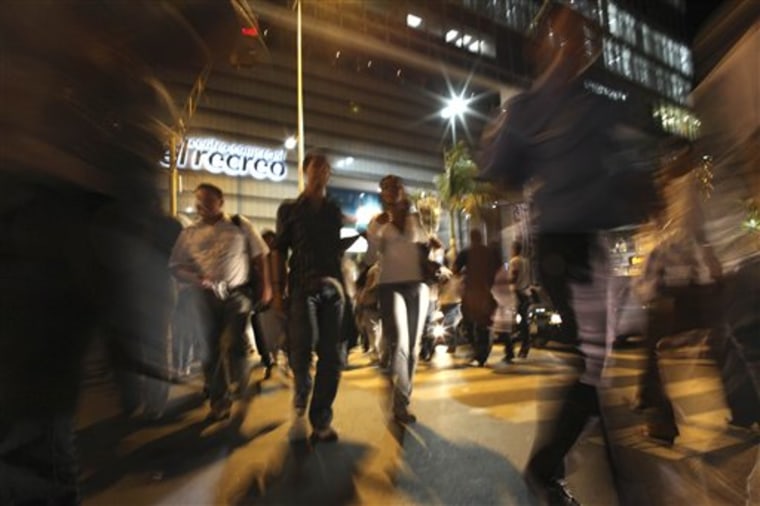A nation built atop a sea of energy is struggling to keep the lights on.
Demonstrators angrily brandish surge-damaged blenders, televisions and stereos outside the offices of Venezuela's state utility company. Others burn electricity bills in the streets to protest recurring blackouts.
A record drought and years of poor planning have made blackouts and water shortages an increasingly frequent fact of life in much of oil-rich Venezuela, prompting protests that have President Hugo Chavez scrambling for answers.
The leftist leader is using his near daily televised speeches to urge Venezuelans to turn down their air conditioners and abandon their swimming pools. He's even lectured the country on the bracing virtues of a cold, three-minute shower.
Chavez has sprung into action in the past week, announcing a contingency plan to conserve electricity and appointing a new Cabinet minister to oversee the electrical sector. Chavez says rationing may be in order and he'll set an example by turning down the air conditioning and turning off more lights at the presidential palace.
Wasting electricity is "a crime," the president says, and on Sunday he warned shopping malls that they use too much power and should no longer rely on a cheap supply. "They're going to have to buy their generator, and if not I'll cut off their power," he said.
Wealthiest get the blame
The socialist leader blamed part of the predicament on wealthy Venezuelans who have swimming pools, wash their cars compulsively and have a TV set in every room. "Those who waste the most are the rich," he said.
Total power consumption has risen about 25 percent since 2004 — a period during which Venezuela enjoyed an oil boom while electricity rates have been frozen, leaving little incentive to save energy.
Millions of poor Venezuelans help themelves to electricity for free by splicing wires onto power lines.
Critics of Chavez contend the government ignored the root of the problem far too long: investments needed to expand power production and satisfy rising consumption.
Opposition newspaper editor Teodoro Petkoff, in his daily Tal Cual, accused Chavez and his allies of neglecting the energy sector and said: "The electricity crisis is Hugo Chavez's legitimate son. DNA tests are not necessary to prove it."
Chavez concedes that delays in maintenance and faulty planning are partly to blame, but insists that rising demand and recent weather changes are bigger problems.
"It's El Nino," he said, referring to the periodic phenomenon in which warming of the tropical Pacific Ocean creates unusual weather patterns.
El Nino is blamed for a lack of rainfall that is causing water shortages and starving the hydroelectric dams that produce about three-fourths of Venezuela's electricity. Chavez says the water level at the Guri dam, the country's largest, is about 30 percent below its previous record low.
Venezuela's rainy season ends next month and significant rainfall isn't likely to return until May or June, so many experts expect more power failures.
Water rationing set to start
Staggered water rationing — by cutting off supplies to a district for a day — is due to start in Caracas next month and Chavez is calling on Venezuelans to conserve water.
He recently joked that he needs only three-minute showers: "I've counted and I don't end up stinking; I guarantee it."
Chavez's government is distributing energy-saving light bulbs and setting up diesel-powered generators in the most affected regions. He is also mulling a decree that would let the government fine consumers who use too much electricity.
He says businesses should turn off their illuminated signs.
A power outage that knocked out a nebulizer used to treat her 2-year-old daughter for asthma prompted Aixa Lopez, a 39-year-old lawyer in Caracas, to start a pressure group that monitors the extent of the problem.
Her Committee for People Affected by Power Outages reports that blackouts have recently hit all of Venezuela's 24 states, and eight of them are suffering frequent outages — on average three to five times a week and up to 12 hours at a time in the worst cases.
Blackouts at hospitals have interrupted surgeries. Several major outages in Caracas this year have shut down the subway and street lights.
"There's no denying government inefficiency caused this crisis," Lopez said, noting that Venezuela never experienced significant power outages or other problems before Chavez nationalized key electrical companies in 2007.
The government says it has spent $16.5 billion on updating the electrical grid since 2002, but only two of about three dozen projects have been fully completed, according to the Web site of the state-run electricity corporation.
In areas where blackouts are most frequent, some exasperated Venezuelans seem to be losing their patience.
Farmer Rafael Moreno said one blackout shut down the air conditioning system at his chicken farm in western Tachira state and killed more than 12,000 chickens.
"I lost over $27,000 in a matter of four hours," said Moreno, who has since bought diesel generators to cope.
